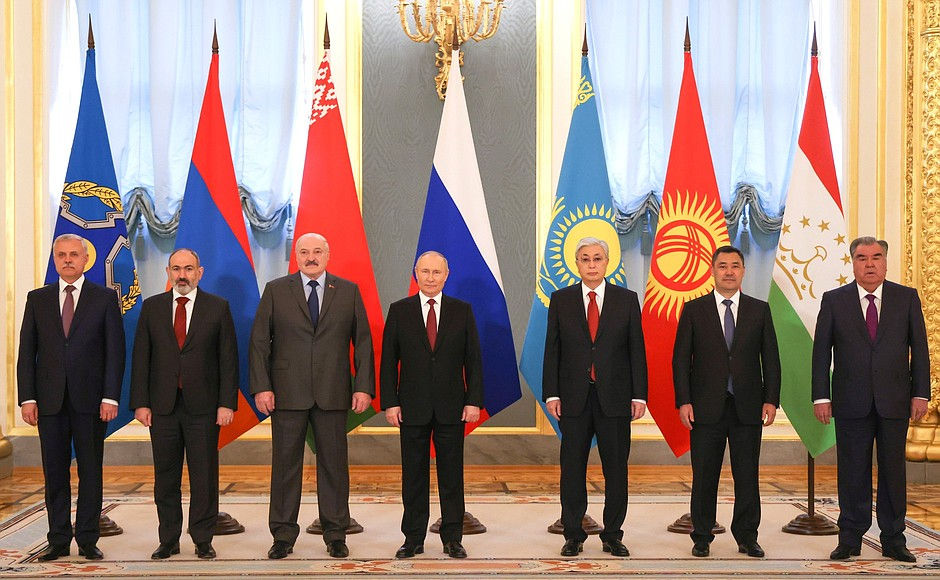The West’s Golden Opportunity to Split Russia’s ‘Deathbed Alliance’
- Jul 10, 2025
- 4 min read
Coordinated Western efforts to persuade Eurasian nations to reduce ties to Russia would diminish Moscow's influence and vex the Kremlin.

Source: TASS
While Belarus, Armenia, Kazakhstan, Kyrgyzstan, Tajikistan, and Russia are all members of the Collective Security Treaty Organization (CSTO), which the Kremlin sees as its uncontested sphere of influence, the authoritarian-leaning group lacks a strong, unified purpose and is ripe for disruption.
By systematically pooling instruments of power, Western states could collectively work to isolate Moscow from some of its allies through a finely tuned, country-by-country strategy.
CSTO, which was set up after the break-up of the Soviet Union, has a history of fluctuating membership and inconsistent responses to crises. It failed to intervene during ethnic violence in Kyrgyzstan in 2010, and did not defend Armenia during the 2020 Nagorno-Karabakh War or from Azerbaijan’s 2021-2023 follow-on actions. Armenia has since suspended its participation.
The CSTO did, however, deploy forces to Kazakhstan to quell protests and an apparent coup attempt in January 2022.
The lack of coherence and coordination in the organization was demonstrated in March when Secretary General Imangali Tasmagambetov announced it would be ready to aid Russia if the European Union (EU) deployed a military contingent to Ukraine, only to have his comments swiftly “clarified” by a spokesperson to stop escalating tensions within the group.
Even though Russia could theoretically invoke Article 4 of the CSTO charter to request assistance from its allies, it has turned instead to North Korea for additional troops, weapons, and construction workers in Ukraine.
The group’s absence from the Ukraine war, even during Prigozhin’s insurrection and after Ukraine’s incursions and attacks into Russia, highlights its inherent fragility. Moscow’s reluctance to invoke the “deathbed alliance” of post-Soviet states stems from concerns of appearing weak, triggering Western retaliation, and uncertainty at the way members would respond.
For their part, other CSTO states want to avoid being entangled in Russia’s war due to fears of domestic instability and potentially worsening relations with the West.
Sensing Moscow’s vulnerability, Western states should use instruments of power to incentivize CSTO members to distance themselves from Moscow, thereby further eroding Russia’s regional influence.
One way to exploit existing disaffection in the group is through coordinated messaging. Members have a deep-seated distrust of any Western attempts to incite “color revolutions,” but Russia’s record in Ukraine could be leveraged to reshape dialogue and engagement. Consistent highlighting of Russia’s poor military planning and economic struggles could convince some states to begin reassessing their alignment with Moscow.
Western states can also work to mitigate Kremlin propaganda by stressing that Russia’s invasion of Ukraine is a colossal criminal atrocity. Some CSTO members are already pushing back against Russian soft power initiatives aimed at recruiting people to fight in Ukraine, and Western states should remind leaders, especially those who attended Moscow’s Victory Parade, that unchecked aggression threatens key tenets of the international legal order.
However, the group’s members are economically entwined with Russia, and all but Tajikistan are also members of the Eurasian Economic Union. This is reflected in their diplomatic stances, such as during the UN General Assembly’s vote on Ukraine on March 2, 2022, when the world overwhelmingly condemned Russia’s full-scale invasion but Belarus joined Russia to vote against the resolution, and other CSTO members abstained.
This trend extends to military procurement, with some group members, notably Kazakhstan and Belarus, acquiring substantial amounts of their weaponry from Russia.
Western states could intensify their efforts to help members diversify away from Moscow by fostering greater commercial ties, increasing educational exchanges, and developing new trade avenues (such as the Middle Corridor) that circumvent Russia. Western states must also remain firm by imposing restrictions on individuals and entities in CSTO countries that help Moscow dodge sanctions.
At the same time, the West could use legal instruments to encourage greater distance from Russia. The leaders of CSTO states should understand that their ruthless repression and forced departure of civil society activists and protesters could, under certain circumstances, possibly lead to International Criminal Court (ICC) arrest warrants, irrevocably harming their legacies and damaging their countries’ dealings with Western nations.
Some members remain in the organization because they dread the spread of instability if Russia falters, while others fear incurring Moscow’s wrath. Significant disengagement from Russia by Tajikistan and Kyrgyzstan is unlikely due to their dependence on Moscow, and very difficult for Belarus since the country is being reduced to a “vassal state.” Recently proposed state controls over media in Kyrgyzstan also embody a cause for concern.
But the West could focus on reducing Moscow’s disproportionate influence over other members – particularly those with no desire to officially join BRICS – such as Armenia and Kazakhstan.
Any alliance faces uncertainty when its leading state, driven by revanchism and myths of empire, commits itself to a grinding war, and the West could suggest members withdraw before it’s too late.
Eroding Russia’s influence will necessitate a sustained, long-term commitment, and the components of a good Western strategy are already present, awaiting only coordination and decisive action. By skillfully pooling and employing their instruments, Western states could further degrade Russia and support CSTO members in asserting greater autonomy.
By Charles Sullivan. Charles Sullivan is the author of Motherland: Soviet Nostalgia in the Russian Federation (Palgrave Macmillan, 2022) and Leaders of the Nation: Kazakhstan during the Twilight of the Nazarbayev Era and the Russo-Ukrainian War (Palgrave Macmillan, 2025). Article first time published on CEPA web page. Prepared for publication by volunteers from the Res Publica - The Center for Civil Resistance.





Comments